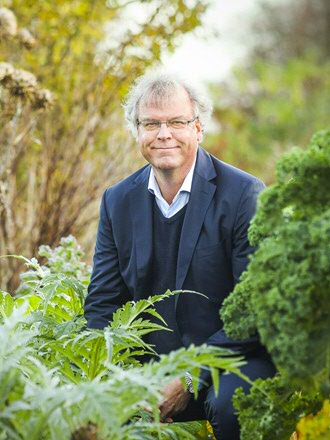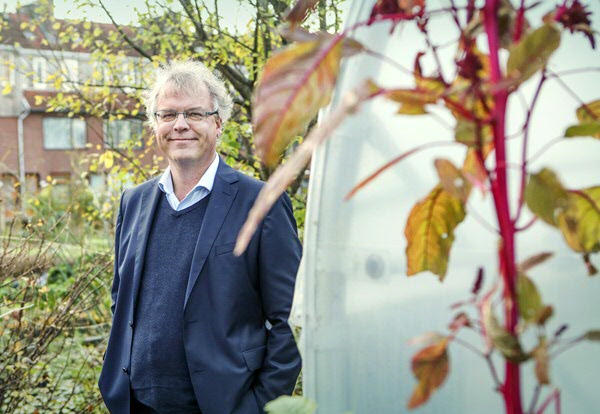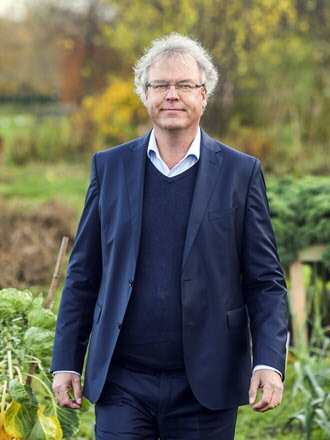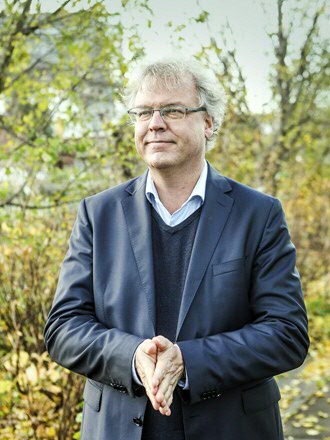Enthusiastic convert preaches sustainable business

Reaching out to sustainable business owners is what Gjalt de Jong is all about. He sees the University as a director of innovation. An independent arbiter who can expedite the shift to a circular economy. To this end, he first needed to change himself; rediscover his core. ‘I want to go outside the University walls. To help solve societal problems. If there’s one thing we can do well, then it is that.’
Text: Riepko Buikema, Communication Office. Photos: Henk Veenstra
He sits at his desk. At home in Norg, Professor De Jong leafs through the pages of business textbooks for higher education. ‘These books always begin with the following sentence: The only reason for businesses to exist is to generate profit and to maximise shareholder value. This strikes me. Global warming, child labour, corruption, the loss of biodiversity: many problems can be directly attributed to the enormous focus on economic growth and maximum profit.’
Mentor Maddison
For decades, economic growth was the starting principle of government policy, academic research, and almost all degree programmes. This also brought us a lot of positives, emphasizes De Jong. Material wealth, financial resources for healthcare, and social safety nets. ‘My first mentor, Angus Maddison, dedicated his entire life to measuring and explaining this growth. And I am still incredibly grateful for the opportunity he gave me: that I, who had just started pre-vocational secondary education, could eventually begin my academic career with him. But I am since almost standing diametrically opposed against the current academic culture of quantitative research into economic growth, often conducted behind desks.’

Big money-makers
De Jong calls it his ‘coming-out’. ‘I am absolutely a researcher, but I am one of a new generation. No rational machine making factual analyses, but a human made of flesh and blood, searching for personal motives.’ This metamorphosis did not take place overnight. The Frisian-born researcher initially worked for large advisory agencies after obtaining his PhD, but began to identify less and less with the big money-makers. He returned to the University where, after time, he became unhappy with the strong emphasis on publishing academic research from within an office.
U-turn
The turning point occurred when De Jong researched the democratic business model of the Breman Installation Group, in which staff members have an equal say to shareholders. ‘At the time, I did not understand how businesses could be successful without the concept of maximizing profit. At Breman, everyone shares equally in the profit and decisions are also made equally. All staff members and owners embrace these democratic principles and are deeply connected to the business. That is precisely why the business is extremely flexible and is always focused on learning new things. For me, it was a total surprise that businesses could also be organized in this manner.’

Doing good
This insight led to an academic quest among sustainable businesses abroad. Once again, De Jong discovered that doing good could be perfectly well combined with business. ‘I learnt how, with involvement, passion, and enthusiasm, you could be professionally successful if you dared to show who you are. How you could balance good intentions and earning enough money. How businesses could solve social and ecological problems. It is precisely this type of business that is now popping up everywhere in the Northern Netherlands.’
Revolution
De Jong made the decision to stand behind sustainability. ‘At Campus Fryslân, I am focusing on business owners whose common purpose is to solve ecological or sustainability problems, through which they earn money. This demands radical innovation, an academic revolution. It goes beyond the work of one professor of ethics or of corporate social responsibility. If you want to achieve real societal impact, then you must leave the academic ivory tower to join forces with businesses, organizations, and the government in the search for solutions. That requires not being in the office all the time, not spending your evenings sitting at home. It requires plenty of patience, time, and energy. Conversations during which you think: where is this going? This is only possible on the basis of a strong, intrinsic motivation to achieve a better world.’
Support
His U-turn led to a surprising by-catch. De Jong’s LinkedIn posts, lectures, and opinion pieces fell on fertile ground. ‘To my amazement, I almost immediately bumped into a large group of around 40 to 50 natural supporters. Real soulmates. Business owners, civil servants, volunteers, colleagues. “Join the club”, they exclaimed. “We share knowledge, we help one another, we learn from one another. We have a joint mission: there’s one planet, let’s save it.” You can only do that if you really feel it.’
This led to the foundation of the Vereniging Circulair Friesland (Circular Friesland Association). ‘A network with over 100 members, including wastage company Omrin, construction company Dijstra Draisma Groep, transport company Arriva, housing association Elkien, almost all educational institutions, architects, innovative technological businesses, and social workspaces such as Caparis. All these businesses have embraced the transition to broad prosperity and have embedded sustainable goals into the core of their business models.’

Speed up
These are encouraging initiatives on the way towards a circular economy, claims De Jong. But there is still a long way to go; the transition is taking too long. ‘The big businesses are still hesitant. That isn’t surprising, given the old paradigm of profit maximization. Over the coming decade, we must speed up this transition. It cannot revolve around a lone sustainable frontrunner, or even 10 of them. It is crucial to entice the large middle group: they need to change while there’s still time.’
Credible
That is incredibly difficult, the professor acknowledges, but the University of Groningen can help in this. As a director of innovation, as an independent arbiter with knowledge and skill. ‘We know the success factors of businesses in the transition. Step one: a little bit of sustainability is not sustainability. With this, you’ll irrevocably come into problems with your credibility. Sustainability must be central: which ecological or social problems will your business solve? This requires sincere intentions, specific norms and values, and a certain leadership. That’s where it starts. Of course, such a transition is not all sunshine and roses. You will constantly face paradoxes. How can you prevent going bankrupt? The research conducted by our PhD students offers answers and solutions to these kinds of questions.’
In a certain sense, convert De Jong has returned to follow the path of his recently deceased father. In the ‘70s, Heit De Jong was an employee at the former vocational school for animal husbandry and grassland industry in Oentsjerk, where he became seriously engaged with development economics, in producing food for poor countries. Gjalt De Jong: ‘In our work, we must take our norms and values into account. In my case, that means caring for others, for the mienskip in Frisian. Doing good for others: that is at my core.’
| Last modified: | 21 December 2021 3.22 p.m. |
More news
-
29 April 2024
Tactile sensors
Every two weeks, UG Makers puts the spotlight on a researcher who has created something tangible, ranging from homemade measuring equipment for academic research to small or larger products that can change our daily lives. That is how UG...
-
16 April 2024
UG signs Barcelona Declaration on Open Research Information
In a significant stride toward advancing responsible research assessment and open science, the University of Groningen has officially signed the Barcelona Declaration on Open Research Information.
-
02 April 2024
Flying on wood dust
Every two weeks, UG Makers puts the spotlight on a researcher who has created something tangible, ranging from homemade measuring equipment for academic research to small or larger products that can change our daily lives. That is how UG...
